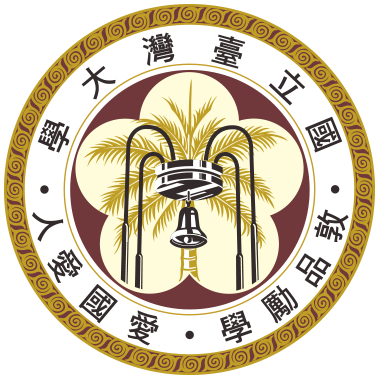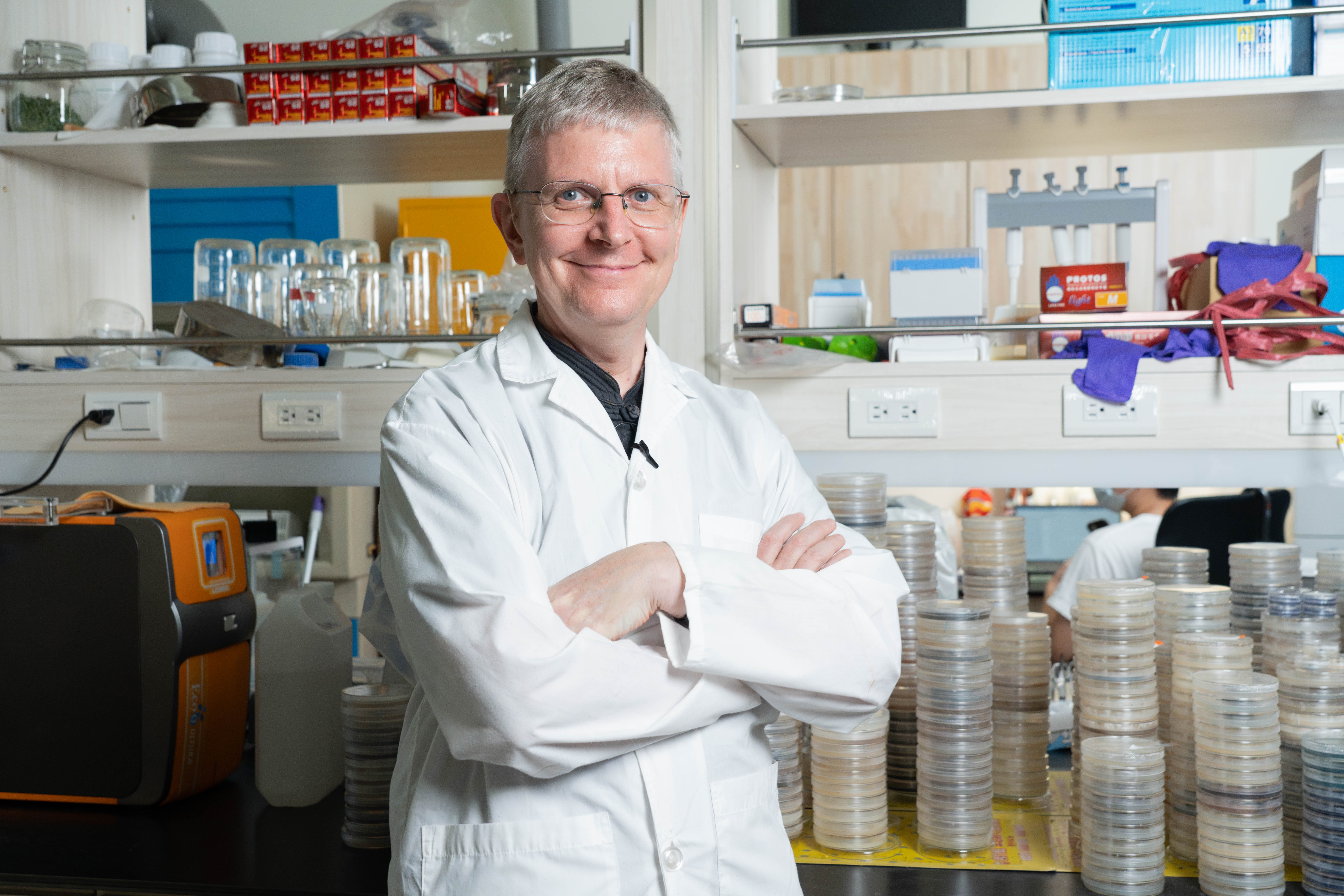If you search for “Professor Roland Kirschner 羅南德“ on the Internet, you’ll find numerous news articles about this German scholar who speaks fluent Mandarin and whose calligraphy skills astonish even locals. In addition to his deep love for classical Chinese culture, Professor Kirschner is a renowned expert in microbial ecology and fungi at NTU’s School of Forestry and Resource Conservation. His passion and commitment to his work, fueled by curiosity about the world and love for nature, have inspired many students and colleagues. Today, after 26 years since his first visit to NTU, Professor Kirschner continues his research journey while exploring Taiwan and embracing his role as a “new immigrant.”
From Childhood Passion to Career in Biology
When asked, 'What do you want to be when you grow up?', the most popular answers we hear are astronaut, teacher, musician, or, for Gen Z respondents, it maybe 'YouTuber', “TikToker”, or some other kind of blogger." However, you wouldn’t get such answers from Prof. Kirschner, whose love for living creatures made him want to be a zoo director. He even refused to eat meat, which was quite rebellious for a youngster in Germany, where different kinds of sausages and other meat dishes are an essential part of the national cuisine. Nevertheless, young Ronald’s love for animals was stronger than other people’s opinions, and after a few years this passion led him down the path of studying biology at the University of Darmstadt in southern Germany.
After earning his Bachelor’s degree, Prof. Kirschner decided to stay in academia and continue his studies at the University of Tübingen and Goethe University in Frankfurt while exploring different research areas. Initially, he had a strong interest in insect diversity and ecology, but since he couldn’t find a suitable supervisor, he switched to fungal diversity and biology. Under the guidance of his new academic supervisor, he was able to combine his interest in insects with his professor’s area of expertise by studying the diversity of fungi associated with bark beetles. He even made some significant contributions by discovering new genera and species of microscopic fungi. This discovery added new insights into the complex interactions between the host plant, the bark beetles, and fungi.
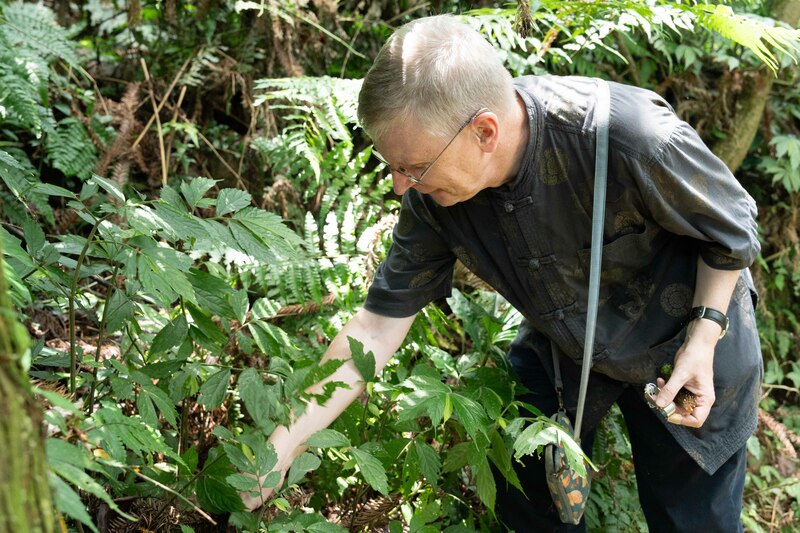
How Interest in East Asian Culture Led Him to Taiwan
Apart from his interest in biology, another lifelong passion of Prof. Kirschner is East Asian culture. His first encounter with it happened during his school years when a Japanese art teacher introduced him to traditional Japanese paintings. Their profound philosophical and spiritual depth didn't resemble anything he had seen before, sparking his interest in studying Japanese ink painting and the basics of Chinese calligraphy. At the same time, he started learning Mandarin and even tried practicing Tai Chi.
Being focused on his academic career in Germany, Prof. Kirschner had not lost his interest in East Asian culture throughout the years, dedicating most of his free time to calligraphy and language learning. These hobbies might have remained mere pastimes if not for an acquaintance with a Taiwanese fellow student who invited him to visit his home country.

He first came to Taiwan in 1998 to attend a one-year Mandarin learning program at National Taiwan Normal University, and as he told us, his first impression of Taipei’s cityscape was far from what he had imagined. A mess of dangling wires, busy traffic, and a mixture of smells wafting through the streets—none of it matched his imagination of Formosa which was mostly based on his study of traditional Chinese culture. However, this culture shock passed in a matter of weeks as he realized that he didn’t want to go back. The feeling of attachment to the place was so strong that he came to Taiwan every year for more than a decade to work with his former fellow student, Chee-Jen Chen, who by then had become a professor with his own laboratory at Southern Taiwan University of Science and Technology in Tainan.
1998 was also the year when Prof. Kirschner visited NTU for the first time. “The library at NTU has a unique collection of scientific literature on biodiversity with descriptions of different species, and so this was the place I went often after attending Mandarin classes in the morning and going to NTU’s Department of Botany for doing some postdoctoral research.”
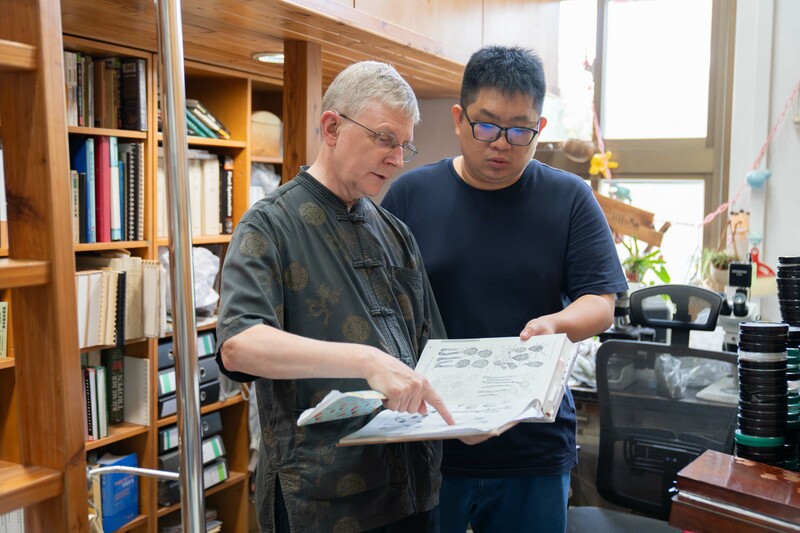
In 2010, Roland Kirschner accepted an invitation to become an associate professor at National Central University in Taoyuan. There, he was able to offer students a wide range of basic courses in fungal and plant diversity. “That was quite a challenging experience,” Prof. Kirschner recalls today. “I had to translate my courses into English and some parts into Mandarin so that students could better understand the terminology. You could say that we were learning together.” He stayed there until 2019 when he joined NTU’s School of Forestry & Resource Conservation.
Fungal Research at NTU
Speaking about his research, Prof. Kirschner says that most of the ideas for it emerge “by chance” just like it happened in university, when he had to switch from insects to fungi. The same happened after he came to Taiwan and found out that the local forestry greatly differs from Europe, therefore he decided to focus specifically on pathogenic and saprobic fungi. These groups are especially important for recycling plant tissues, as they break down organic matter in dead plants, converting it to simple soluble minerals, water, and gases. There is also an economic aspect since fungal diseases pose a major threat to ornamental plants and crops. “The study of fungi is called mycology, and its major challenge for us has to do with the fact, that even though they’re thought to perform a key function in the ecosystem, more than 90% of fungal species remain unknown to science,” explained Prof. Kirschner. So, the main task for him and his students is to get to know as much as they can about different species of fungi and their roles in the local ecosystems.
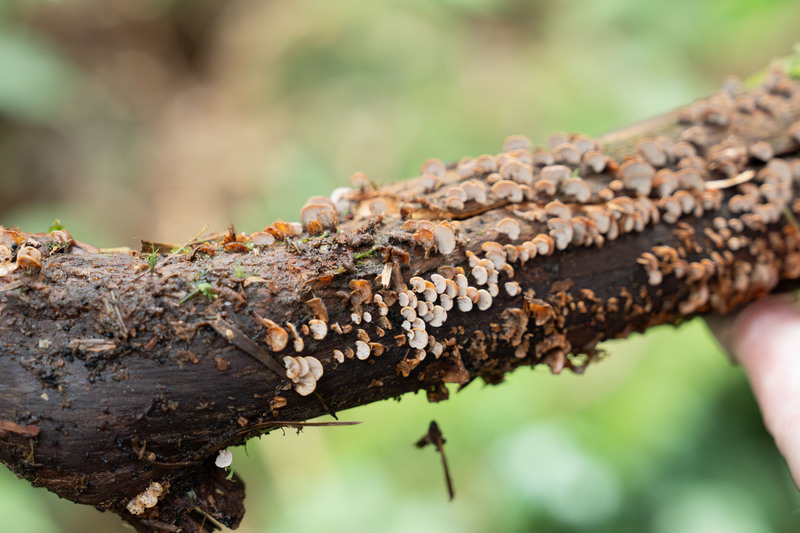
Apart from doing research in his Fungal Resources Laboratory at NTU, Prof. Kirschner also regularly joins students during field trips in the NTU Experimental Forest. It’s located in central part of the island, and along with other NTU campuses, covers nearly 1% of Taiwan's total area, representing diverse environmental conditions of the island. Not only is it abundant in plant species but also in wildlife resources, which makes the Experimental Forest a unique place for academic research and field practice.
When talking about his teaching style, Prof. Kirschner told us that he tries to assign individual research topics for students, giving them as much academic freedom as possible. “In comparison to Germany, the number of people in a class here is significantly smaller, so it’s easier for me to use a personalized approach in teaching” he shared. “Since most Asian schools’ systems are quite rigid result-focused, it is extremely important to guide students in the beginning, so that everyone can find and maintain motivation for pursuing their research”.
Another difference he observed is that funding inequality issue in Taiwan is not as serious as it is in Germany: “The funding from the German Research Society often goes to only those types of academic research, that are considered as “the most “promising” or just “popular” during a specific period of time, while in Taiwan the National Science and Technology Council tends to distribute funding equally among all researches, which is quite beneficial for those who focus on biodiversity studies.”

Fungal Research at NTU
Outside of his work at NTU, Prof. Kirschner continues practicing calligraphy, attending classes every week. He becomes quite humble when discussing his achievements, emphasizing that he still relies on his teacher's instruction. However, he has actually won several local and international calligraphy contests. He also devotes time to Chinese ink painting during prolonged holiday periods. “I try to use images of plants and animals around me and represent them in my works, which is not a very traditional style in Chinese painting.” Tai Chi is another hobby he has cultivated since the student years, and has been doing it every day till nowadays. He says it helps him clear his mind and “charge the batteries” for the day.
It has been 26 years since Prof. Kirschner first came to Taiwan, and for 14 of those years, he has been living here permanently. When asked what it is about this place that attracts him so much, he simply answers that it now feels like home. “I have witnessed all the changes Taiwan has undergone over the last quarter of a century, how it has transformed into a more foreigner-friendly and, overall, more livable place in terms of quality of life, where people from different backgrounds can fit in. For Roland it includes a wide range of high-quality vegetarian food available almost everywhere, a highly accessible healthcare system, ‘all-inclusive’ convenience stores around every corner and many other things that improve his life.
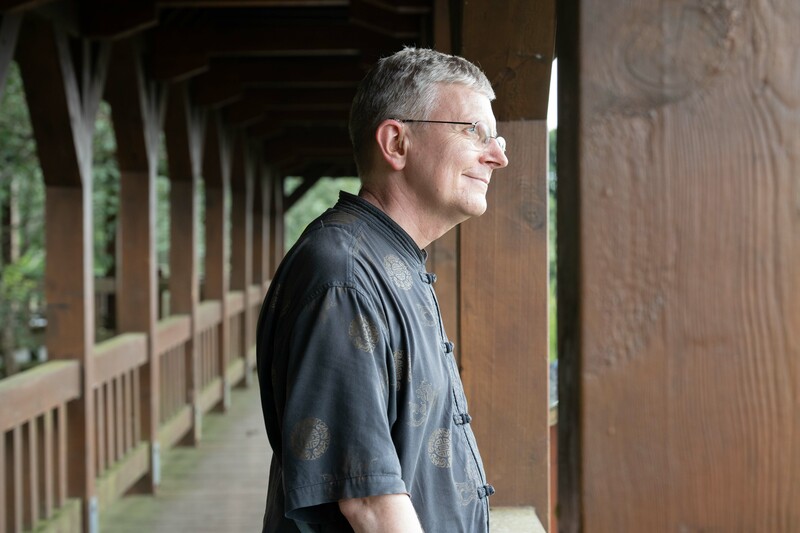
One might be curious whether living in Taiwan for so many years has made Prof. Kirschner feel more Taiwanese in any way. He said that, although deep down he feels his German identity still prevails (especially when encountering the chaotic traffic in Taipei), a lot of what he has learned from Taiwanese people has changed the way he looks at things. “I am grateful to the people who live here for teaching me how to embrace a positive mindset, no matter what the external circumstances are. If you want to savor the present and enjoy life today, Taiwan is the right choice for you.”

